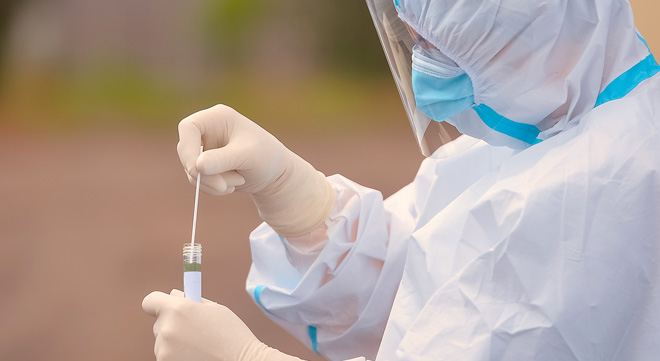The Health Funders Association (HFA) has submitted a complaint to the Competition Commission about the prices charged for Covid-19 tests by the three largest private pathology laboratory groups in South Africa – Ampath, Lancet and Pathcare – during the Covid-19 pandemic.
The HFA represents stakeholders involved in the funding of private healthcare, including medical schemes such as Discovery and Momentum. Its members represent about 73% of open schemes and 50% of total scheme membership.
According to the HFA, several non-member schemes have joined its complaint to the Competition Commission, collectively representing 5.6 million of South Africa’s 8.9 million beneficiaries.
The 35 medical schemes the HFA is representing in its complaint believe they could recover about R1 billion.
The Polymerase Chain Reaction (PCR) test was the main test for Covid-19 infection during 2020 and 2021. Several million PCR tests were conducted during this period, mostly by the three main pathology groups, which have about 88% of the market for pathology testing in South Africa.
A significant portion of the cost of these tests was borne by medical schemes in respect of tests undergone by scheme members seeking healthcare services in relation to Covid-19. Many millions of PCR tests were also paid directly by ordinary South Africans for travel and other purposes.
Attempts to reduce the price
According to the HFA, the “national policy consensus” at the time of the Covid-19 pandemic in 2020 was that no party should profit from the pandemic, and consumers were to be protected from the excessive, unfair and unreasonable pricing of goods and services during the national state of disaster. “Thus, at the start of the pandemic, there was in-principle agreement among stakeholders that the price of Covid-19 PCR tests should be on a cost-recovery basis for the duration of the pandemic.”
A price of R850 per PCR test was agreed at the start of the pandemic on the premise that this price would be reduced as the input costs decreased and there was greater clarity about the volume of Covid-19 testing required, the organisation said.
The HFA said that despite “substantial reductions” in the input costs for PCR tests, the prices charged by the main private pathology groups were not reduced.
It said medical schemes and their administrators made several attempts to negotiate lower prices for PCR tests with the main private pathology groups during 2020 and 2021.
“Each of these attempts to engage amicably with the main private pathology groups through commercial discussions were unfortunately unsuccessful, with the three main private pathology groups standing together to deny any price reductions.”
Voluntary settlement agreements
In October 2021, the Council for Medical Schemes lodged a complaint with the Competition Commission against the three main private pathology groups regarding Covid-19 PCR test prices, the HFA said.
In December 2021, before the Competition Commission concluded its investigation, separate voluntary settlement agreements were reached between the Competition Commission and the three main private pathology groups. In terms of the consent agreements, Ampath, Lancet and Pathcare agreed to a 41% reduction in the price of Covid-19 PCR tests, lowering the price from R850 to R500 with immediate effect, the HFA said.
“The Competition Commission’s investigation into these allegations of excessive and unjustifiable pricing by the three main private pathology groups confirmed that the input costs incurred by the said three main pathology groups for Covid-19 PCR testing had significantly reduced between March 2020 and September 2021, and that the three main private pathology groups had been earning substantial profits from Covid-19 PCR testing since March 2020.
“This investigation also indicated to the Competition Commission that excessive pricing on Covid-19 PCR tests may have been occurring and that, on a prima facie basis, the three main pathology groups had contravened section 8(1)(a) of the Competition Act,” according to the HFA.
The terms of the consent agreements were on a “no-admission of guilt” basis, with none of the three main pathology laboratories admitting any infringement of the Competition Act or any consumer protection regulations.
“Notwithstanding this, the consent orders do not protect the three main private pathology groups against further complaints and investigations into the price of the PCR tests, or recoupment of damages if indeed the prices are found to have been excessive or agreed between them as competitors,” according to the HFA.
Pathcare disputes the allegations
The HFA said medical schemes and their administrators have no alternative but to turn to the Competition Commission because they have been unable to resolve the matter through engagements with the three main private pathology groups.
The action aligned with the mandate of medical scheme trustees to act in the best interests of the schemes and their members to recover any unnecessary expenditure incurred by the schemes, it said.
“These recoveries represent member funds and will accrue to the reserves of medical schemes. Further, the reserves have a direct bearing on the ability of schemes to pay claims and potentially also on future contribution increases for members.”
Business Day quoted Pathcare chief executive John Douglass as saying he was disappointed by the HFA’s action.
He said Pathcare had provided the Competition Commission with detailed information that “clearly showed we didn’t overcharge”, and the two-year consent order required it to provide data on an ongoing basis.
Input costs had fallen only for the high-volume instruments used in central locations such as Cape Town, but not for the smaller machines used in peripheral sites such as Bloemfontein, Douglass was quoted as saying.
Samantha Swanepoel, chief strategy officer of Ampath, told News24 they were waiting to hear from the Competition Commission about the matter. “We want to understand the full extent of the complaint. We will co-operate with the Competition Commission to understand any concerns raised,” she was quoted as saying.



